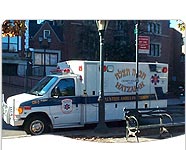 
Inflamation in COPD Patients
NEW YORK (Reuters Health) - Results of a detailed pathological study show that the small airways are the major site of airway obstruction in patients with
COPD and that these are compromised by the presence of inflammatory exudates, according to findings published in the June 24th issue of The New England
Journal of Medicine.
"Our study provides insight into the pathogenesis of this process and suggest possible therapeutic targets for the treatment of COPD," Dr. James C. Hogg
from St. Paul's Hospital Vancouver, British Columbia told Reuters Health.
He and colleagues examined the evolution of COPD by studying physiological changes in surgically resected lung tissue from 159 patients who ranged from
being at risk of COPD to having very severe disease.
Dr. Hogg added that "the data show that the airway obstruction that develops as a result of chronic inhalation of toxic particles and gases in tobacco smoke
and other air pollutants results in an accumulation of inflammatory exudates in the wall and lumen of the small conducting airways."
These changes begin in the early stages of disease and are associated with an active repair and remodeling process that eventually thickens the walls and
narrows the lumen of these airways by forming scars.
"In the severe and very severe stages of COPD," he continued, "we found evidence of an adaptive immune response that is temporally related to the colonization
and infection of the lung with several human pathogens."
Taken together, these changes represent the results of a chronic innate and adaptive inflammatory immune response to the injuries inflicted by chronic
inhalation of toxic gases and particles. "This injury eventually interferes with the lungs' natural defenses and allows the lungs to be colonized with a variety of
pathogenic microbes."
In an accompanying editorial, Dr. Peter J. Barnes from Imperial College, London notes that it is remarkable that "the inflammatory response in COPD appears
to increase with the severity of disease and therefore with time, rather than burning out, as it has been shown to do in other chronic inflammatory diseases
such as rheumatoid arthritis and interstitial lung disease."
"This observation," he concludes, "has important implications for future therapy for COPD and suggests that treatments directed at these mechanisms should
be of value at all stages of disease, even in patients with the most severe illness."
The above message comes from "Reuters Health", who is solely responsible for its content.
The above is for general informational purposes only. Always consult your
physician regarding specific medical issues and call Hatzalah or your local
ambulance service in the event of an emergency.
Back to Digest Index
|









